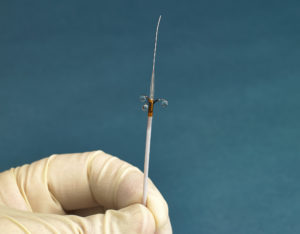
Ablative Solutions has announced that positive six-month results from the Peregrine post-market study demonstrating the safety and efficacy of the company’s CE-marked Peregrine System infusion catheter were published in the Journal of the American College of Cardiology: Cardiovascular Interventions.
The Peregrine post-market Study is a European multicentre open-label trial that evaluated additional safety and performance of the Peregrine System infusion catheter using a neurolytic agent (dehydrated alcohol) delivered into the space outside of the renal (kidney) arteries in 45 patients with systemic hypertension. Patients included in the study were taking at least three anti-hypertensive medications.
At six months, mean 24-hour ambulatory SBP was reduced by 11mm Hg, and diastolic blood pressure was reduced by 7mm Hg. Medication adherence was monitored and remained stable throughout the study. The primary safety endpoint, defined as absence of periprocedural major vascular complications, major bleeding, acute kidney injury, or death within one month, was met in 96% of patients (95% CI: 85–99%).
“Publication of the Peregrine post-market study results in a respected peer-reviewed journal is a significant milestone for Ablative Solutions and shows the potential of the Peregrine System to become an important adjunctive therapy for managing uncontrolled blood pressure in this large patient population,” said Kate Rumrill, president and chief executive officer at Ablative Solutions. “We are committed to robust clinical research through our ongoing Target BP clinical trials program to further substantiate the procedural, clinical, and health-economic benefits of the Peregrine catheter for the treatment of hypertension.”
In an accompanying editorial, Deepak L Bhatt and Arjun Majithia (Harvard Medical School, Boston, USA) noted that “although the Peregrine system will clearly need to be tested in a randomised, blinded, sham-controlled clinical trial environment, the study investigators should be complimented for using rigorous, contemporary methods including objective adherence measurements (urine toxicology analysis) and appropriate, clinically relevant endpoints (ambulatory blood pressure).”
Twelve-month results from the study presented last fall at the 2019 European Society of Cardiology (ESC) Congress (31 August–4 September, Paris, France) showed that the statistically significant reduction of 24-hour mean systolic ambulatory blood pressure measurement (ABPM) at six months was sustained at 12 months, providing evidence of consistent blood pressure-lowering effect. Twelve-month results also showed a reduction of mean systolic 24-hour ambulatory blood pressure of 10mmHg (±17mmHg, p=0.001) and a reduction in systolic office blood pressure of 20mmHg (±23 mmHg, p=0.001). No patients had major adverse events.
“Results from this trial show that the renal denervation procedure using the Peregrine Catheter and alcohol as a neurolytic agent may be safe and effective for lowering blood pressure in patients with poorly controlled hypertension on medications,” said Prof. Felix Mahfoud, Saarland University Hospital, Homburg, Germany. “The publication of these data further proves the potential value of the system for both physicians and patients. We look forward to further studying the investigational product in the randomised, sham-controlled TARGET BP clinical programme.”
Worldwide, hypertension affects more than one billion people. Management of hypertension often requires multiple medications. More than half of those treated with antihypertensive medications do not achieve their target blood pressure. High blood pressure can eventually lead to serious health problems such as heart attack, stroke and loss of vision. Approximately half of people with uncontrolled hypertension die of heart disease related to poor blood flow, and another third die of stroke.
The investigational Peregrine Kit, which includes the Peregrine System Infusion Catheter (Peregrine Catheter) and Ablative Solutions dehydrated alcohol, is currently being investigated in the TARGET BP clinical program which comprises two clinical trials. Data from the TARGET BP I and TARGET BP OFF-MED trials will be used to continue to advance the understanding of renal denervation.
At CRT 2019, (2–5 March (Washington, DC, USA) Horst Sievert (Sankt Katharinen Hospital, Frankfurt, Germany) shared early results of alcohol-mediated renal denervation, which were presented as a late-breaking abstract at the conference. Watch the video here.









